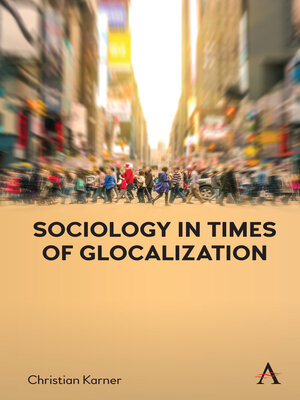
Sign up to save your library
With an OverDrive account, you can save your favorite libraries for at-a-glance information about availability. Find out more about OverDrive accounts.
Find this title in Libby, the library reading app by OverDrive.



Search for a digital library with this title
Title found at these libraries:
| Library Name | Distance |
|---|---|
| Loading... |
Seminal sociological work has described the world today as a 'local-global nexus' that is defined by localized, often conflictual responses to a series of 'global flows'. Building on this, this book traces the workings and dynamics of today's globalization, and of the different reactions it spurs, across a range of social domains: that is, in localities affected by rapid infrastructural change; in the economic realm and through consumerism; in experiences of migration; in urban settings; in cultural practices such as street art that negotiate both global and local events and phenomena; and in digital technology. Crucially, the book formulates and critically explores the methodological challenges created by such social and political developments. Rather than treating the fundamental question as to how and why sociologists can claim to know more about the social world than the people 'living it' as an abstract issue, this book tackles this through a careful engagement with existing research on globalization, glocalization and neo-nationalism. The result is two-fold: first, the book demonstrates that sociology confronts some profound challenges today; second, the author argues that an increasingly inter-disciplinary sociology is already making vital contributions to our understanding of – and responses to – today's multiple crises.
|This book examines contemporary globalization, its local impact and counter-reactions to it both thematically and epistemologically. The starting point is an outline of the distinguishing features of contemporary globalization, their (dis)continuities with historically earlier forms of long-distance connections, and their relevance to both recent and long-established sociological debates. Through a series of thematic case studies, Sociology in Times of Glocalization traces the methodological and conceptual innovations underway to capture the politically heterogeneous responses to our global interconnectedness, which are (re)shaping individual and collective self-understandings, localities, regions, nation-states, as well as diasporic communities at present. The discussion thereby also shows that multiple global 'flows', neo-nationalist as well as other forms of identity politics jointly constitute our era's constitutive, if highly contradictory characteristics.
The book's most distinguishing feature is to be found in its central analytical move. Having identified the building blocks of today's complex, multi-dimensional and contradictory forms of 'glocalization', it approaches those epistemologically: that is, by asking how globalization and the various reactions to it can be approached, captured and understood sociologically. This requires nuanced methodological reflections on how social scientific claims to knowledge are generated in the specific contexts under investigation. Put differently, the book unfolds around two core-issues: first, the question as to what contemporary, 'glocalizing' realities entail; second, the yet more challenging, hitherto underexplored question as to how social scientists can recognize, depict and make sense of such historically novel realities and experiences.
Located in the interface between the thematic and the methodological, the book offers discussions of particular global flows and of specific reactions to them. The thematic foci in question pertain to localities affected by rapid infrastructural change; the economic realm and consumerism; experiences of migration; social change in urban settings; cultural practices such as street art that negotiate both global and local events and phenomena; and digital technology. The critical discussions offered underscore that contemporary...







